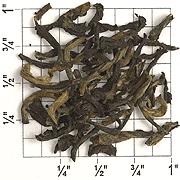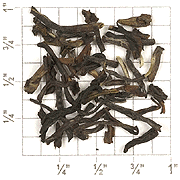In a past life, over at Tea Leaves, I’ve already discussed my favorite purveyor of fine tea, Upton Tea Imports. I’m not their only fan, either. Another season has come and gone, and with it another care package from Upton. Here are my capsule reviews.
 The biggest winner, to my surprise was the Organic Yunnan Select Dao Ming. I ordered this as an experiment, with some trepidation. “Organic” is a word all too often associated with “stale and tasteless,” particularly with respect to comestibles like tea where freshness, among the vast majority of consumers, is (wrongly) not a concern. The Yunnan Dao Ming is very drinky, with a medium body and the expected spicy note. It is not a transformative experience, by any means, but then at $7/125 grams it is also less than half the price of China Yunnan Superior, which strikes me as an entirely reasonable tradeoff.
The biggest winner, to my surprise was the Organic Yunnan Select Dao Ming. I ordered this as an experiment, with some trepidation. “Organic” is a word all too often associated with “stale and tasteless,” particularly with respect to comestibles like tea where freshness, among the vast majority of consumers, is (wrongly) not a concern. The Yunnan Dao Ming is very drinky, with a medium body and the expected spicy note. It is not a transformative experience, by any means, but then at $7/125 grams it is also less than half the price of China Yunnan Superior, which strikes me as an entirely reasonable tradeoff.

The Organic Keemun Dao Ming by the same supplier was extremely disappointing. Flat, characterless, it lacked all the assertiveness and smoky flavor one comes to know and love in Keemun. This was more in line with what I expected when I held my nose and ordered an organic tea. It may be unfair to blame its organic nature — the fact is, like buying burgundies, obtaining Keemun of any type is often a hit-and-miss experience; even the famed Hao Ya “A” has a reputation for being superb one year and lackluster the next. In any case, I don’t recommend this tea, even at bargain-basement prices.

I continued my never-ending and probably doomed quest to find an Indian tea that I enjoy more than a standard malty no-name Assam. This season’s entry is the Sikkim Temi Estate FTGFOP1 CL . See, I don’t really enjoy Indian tea as much as Chinese tea, but I keep buying it simply because it gives me the opportunity to go around saying things like “Fine tippy golden flowery orange pekoe clonal.” This tea might become my standard Indian contender — it has tannic Darjeelingesque overtones without the characteristic lackluster thin body of that more famous but, in my opinion, inferior tea. It’s got panache. It’s got vim. I like it. At $8.60/125 grams it is more expensive than its superior Chinese brethren, but much less expensive than the ludicrously priced Darjeelings out there.
I usually throw an ultracheap alternative in to my orders just to see if I discover a diamond in the rough. Unfortunately, the generic Australian black BOP was not that diamond, nor not even an opal. It’s tannic, rough, scratchy, and has a funny sort of onion-like aftertaste. The price was right, at $3.20/125 grams, but the tea was not.
I am always open to recommendations — what tea are you drinking?





My second most consumed tea from Upton Tea – my afternoon tea – is the Robert Fortune Blend 41, a combination of Darjeeling and Yunnan. I’m afraid I lack the ability to describe tea much beyond “hey, I like this one!” but I’ll say that that the RF Blend holds up to milk (I’m hopelessly stuck on putting milk in all my tea) and it doesn’t leave a bitter aftertaste as some I’ve tried. It’s also relatively inexpensive.
I’ll have to try that one! I also sometimes put milk in (black) tea. It drives Peter, the guy from “Mixed Logs”, insane. He says I am an apostate.
Hey, check this site out (just found via food blog): http://www.nicecupofteaandasitdown.com/